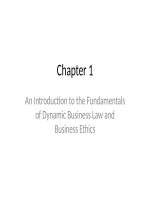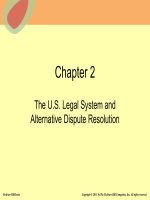An introduction to the fundamentals of dynamic business law and business ethics chap005
Bạn đang xem bản rút gọn của tài liệu. Xem và tải ngay bản đầy đủ của tài liệu tại đây (98.16 KB, 29 trang )
Chapter 5
Criminal Law and Business
McGraw-Hill/Irwin
Copyright © 2013 by The McGraw-Hill Companies, Inc. All rights reserved.
Chapter 5 Case Hypothetical and Ethical Dilemma
Warren Delaney believed that his home was his “castle,” and during the summer months every year,
his “castle” was a tiny cabin nestled in the woods of upstate New York. Delaney was an Economics
professor at a small college in Florida, and for him, there was no better way to “rest and recharge”
after a hectic academic year than to head north for the cozy confines of his cabin.
For several consecutive years, Warren’s cabin had been vandalized and/or burglarized during the
winter months while he was in Florida. During the winter of 2006, several windows had been
shattered. In the winter of 2007, several pieces of furniture had been stolen. At some point during
the winter of 2008, the bedroom mattress had been ripped apart for some unexplained reason, with
foam and fabric scattered about the bedroom floor. On each of these occasions, the perpetrator had
forced the front door lock open, and had entered the cabin through the front door.
Warren envisioned a way to stop the criminal(s) responsible for these violations. He spring-loaded a
shotgun in the living room of the cabin, and pointed it directly at the front door. The shotgun was
configured so that if someone opened the front door while he was away, it would fire at the intruder.
Warren returned to his cabin in May 2010 and came upon a grisly scene. The front door had been
opened, and at the threshold was the partially-decomposed body of what appeared to be a middleaged man, dead of a shotgun blast to the chest. Warren immediately called the local sheriff, Officer
Brian Mulholland. Upon arriving at the scene and briefly questioning Warren, Officer Mulholland
arrested him.
Was the arrest valid? Did Warren Delaney commit first-degree murder? Did Warren use justifiable
force in this situation?
5-2
Chapter 5 Case Hypothetical
Thomas Townsend has an embarrassing criminal past. In 1985, he was convicted of pedophilia, having had
sexual relations with a 15-year-old child (at the time, Townsend was 29 years old.) By all accounts, Townsend
has led a relatively uneventful life over the years since 1985, spending most of his time building and selling
musical instruments to earn a living, and reclusively “keeping to himself” on his property on the edge of town.
Local police investigators are curious whether Townsend has truly learned from “the error of his ways.” The
local sheriff has received a number of complaints from area citizens, who are appalled that a child sex
offender is “among their midst.” Working in collaboration with the Federal Bureau of Investigation (FBI,) local
police authorities devise and implement a plan to determine whether Thomas is leading an innocent life. Over
the course of an eighteen-month period, police investigators mail Townsend a circular they have created,
advertising a fictitious publication called “Lustful Lads and Lasses.” Among other pronouncements, the
circular entices readers to “order now before publication ceases; see young boys and girls aged 12-16
engaged in all sorts of acts only big boys and girls should be allowed to do!”
Having received the circular each month and having declined on seventeen occasions, Townsend finally
responds to the circular on the eighteenth occasion, mailing in the $39.95 purchase price. Local, state and
federal authorities immediately intervene, arresting Townsend for solicitation of child pornographic materials.
At Townsend’s arraignment hearing, his attorney moves for immediate dismissal of the charges, arguing
entrapment. Do the police efforts described constitute entrapment? Does entrapment justify dismissal of all
charges against the accused? Rather than dismissal of charges, why not simply sanction those authorities
responsible for the entrapment?
5-3
Elements of a Crime
• “Actus Reus”—Wrongful behavior
(guilty act)
• “Mens Rea”—Wrongful state of mind,
such as purpose, knowledge,
recklessness, or negligence (guilty
mind)
5-4
Classification of Crimes
• Felonies—Serious crimes punishable by
imprisonment for greater than one year, or
death
• Misdemeanors—Less serious crimes
punishable by fines, or imprisonment for
less than one year
• Petty Offenses—Minor misdemeanors
punishable by small fines or short jail
sentences
5-5
White Collar Crime
Definition: A variety of nonviolent illegal acts against
society that occur most frequently in the business
context
5-6
Crimes Affecting Business: “White
Collar” Crimes
• Bribery
• Extortion
• Fraud
• Embezzlement
• Computer Crimes
5-7
Bribery
Definition: The offering, giving,
soliciting, or receiving of money or any
object of value for the purpose of
influencing the judgment or conduct of
a person in a position of trust
5-8
Extortion (Blackmail)
Definition: The making of threats for the purpose of
obtaining money or property
5-9
Fraud
Definition: A variety of means by
which an individual intentionally
uses some sort of misrepresentation
to gain advantage over another
person
5-10
Elements of Fraud
• A material false representation made with intent
to deceive;
• A victim’s reasonable reliance on the false
representation; and
• Damages
5-11
Exhibit 5-1: Selected Types of
Fraudulent Crimes
•
•
•
•
•
•
Forgery
Defalcation
False Entries
False Token
False Pretenses
Fraudulent
Concealment
•
•
•
•
•
•
Mail Fraud
Health Care Fraud
Telemarketing Fraud
“Ponzi Schemes”
Check “Kiting”
“Pretexting”
5-12
Embezzlement
Definition: The wrongful conversion
of another’s property by one who is
lawfully in possession of that
property
5-13
Computer Crime
Definition: Any wrongful act that is
directed against computers, uses
computers to commit a crime, or
involves computers
5-14
Criminal Procedure
5-15
Differences Between Criminal and Civil
Procedure
Criminal Procedure
•
•
•
The government, through a
prosecutor, always brings
the criminal case
The objective is punishment,
in the form of a criminal fine
and/or imprisonment
Numerous constitutional
safeguards for the criminal
defendant
Civil Procedure
• The party filing the case, the
plaintiff, can be an individual,
business, or government entity
• The objective is to remedy a
wrong done to the plaintiff, so
the defendant will either have
to pay money damages, or be
subject to an equitable remedy
(injunction or specific
performance)
5-16
Constitutional Safeguards: The
Fourth Amendment
• Protection from “unreasonable search and
seizure”
• Restrictions on warrants
5-17
Constitutional Safeguards: The
Fifth Amendment
• Prohibition of “double jeopardy”
• Right not to incriminate oneself
• Right to “due process”
5-18
Constitutional Safeguards: The Sixth
Amendment
•
Right to a speedy and public trial
•
Right to a trial by an impartial jury of one’s peers
•
Right to be informed of the accusations against
oneself
•
Right to confront witnesses
•
Right to have witnesses on one’s side
•
Right to counsel at various stages of the
proceedings
5-19
Constitutional Safeguards: The Eighth
Amendment
• Freedom from excessive bail
• Freedom from excessive fines
• Freedom from cruel and unusual
punishment
5-20
Constitutional Safeguards: The
Fourteenth Amendment
• Extension of the right to due process
to all state matters
• Extension of most constitutional
rights to defendants at the state level
5-21
Criminal Procedure: Pretrial Procedure
• Arrest
• Booking
• First Appearance
• Indictment
• Arraignment
5-22
“Miranda Rights”--Before a law enforcement officer engages
in “custodial interrogation,” he/she must inform the defendant
of the following:
•
•
•
•
•
•
“You have the right to remain silent and refuse to answer
any questions”
“Anything you say may be used against you in a court of
law”
“You have the right to consult an attorney before speaking
to the police and have an attorney present during any
questioning now or in the future”
“If you cannot afford an attorney, one will be appointed for
you before the questioning begins”
“If you do not have an attorney available, you have the
right to remain silent until you have had an opportunity to
consult with one”
“Now that I have advised you of your rights, are you
willing to answer any questions without an attorney
present?”
5-23
Criminal Procedure: Trial Procedure
• Jury Selection
• Trial (with burden of proof on
prosecution)
• Jury Deliberations
• Jury Verdict
• Sentencing Hearing (if Defendant found
guilty)
5-24
Defenses to Crimes
• Infancy
• Mistake
• Entrapment
• Necessity
• Intoxication
• Insanity
• Justifiable Use of
Force
• Duress
5-25




![an introduction to the theory of surreal numbers [electronic resource]](https://media.store123doc.com/images/document/14/y/pg/medium_pgk1401470100.jpg)




